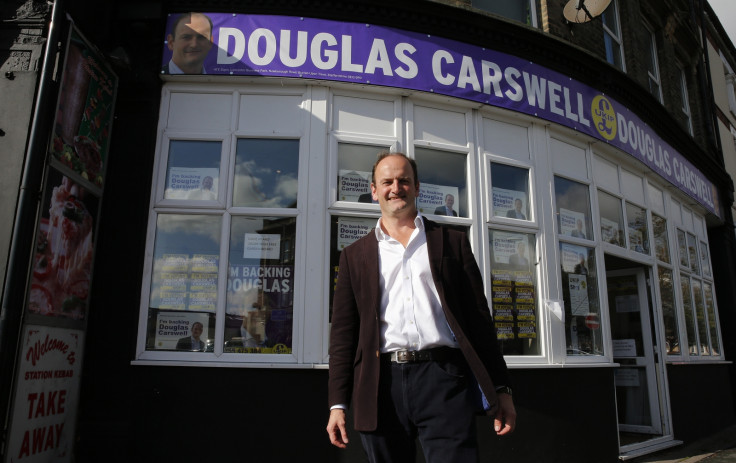David Cameron and Ed Miliband Face Six Month Election Campaign in Constant Dread of Ukip

Ukip's by-elections sensation has left Britain's shell-shocked establishment parties staring at a six month election campaign with all their old certainties demolished and no clear sign they know how to stop the insurgents.
Labour and the Tories were made painfully aware of Ukip's ability to give them bloody noses after the party stormed to victory in this summer's European elections. And they knew they were facing a force with crucial political momentum.
But neither expected the size of the humiliation piled onto them by Nigel Farage's so-called "people's army" in the Clacton and Heywood by-elections, which have written themselves into the political history books.
Despite Labour narrowly holding onto their seat and the Tories claiming they always expected to lose Clacton to a hugely-popular local defector, both Ed Miliband and David Cameron should now be terrified of what the next six months might have in store for them.
If we get this right we may be able to win enough seats at the general election to hold the balance of power.
And Nick Clegg's Liberal Democrats, who fell to some of their worst performances ever, can only look on from the sidelines and hope they will not be wiped out in May.
Farage's suggestion that Ukip could end up holding the balance of power in parliament after the general election may be optimistic but it no longer looks laughable.
He hailed the results as a breakthrough, declaring: "British politics is in a greater state of flux than it's ever been in my lifetime. Labour and the Tories will not have enough to form a majority....if we get this right we may be able to win enough seats at the general election to hold the balance of power."
With voters continuing to abandon the big three parties there is certainly the possibility that a number of smaller parties including Ukip, nationalists and Greens, could all have huge influence in another hung parliament, denying the LibDems of their kingmaker role.
For the Tories, all attention now moves to the looming Rochester by-election where defector Mark Reckless is seeking to follow Douglas Carswell's example and become Ukip's second elected MP.
The Conservatives are planning to pile resources into the seat where they believe Reckless is far less popular and far more vulnerable than Carswell. If they fail to hold the seat it will be devastating and spark real panic in the ranks, possibly prompting other backbenchers to jump ship in the belief their election chances are better as members of Ukip.
Farage has again hinted that is likely, but also claimed there are Labour MPs who might also consider defecting.
Tory chairman Grant Shapps' desperate warning that the results had taken Labour "a step closer to Downing Street" betrayed the party's dismay at their inability to contain Ukip.
If Ed Miliband does not broaden the Labour coalition to better include working class opinion then we cannot win a majority government. Ed Miliband does a lot of listening. Now he needs to do a bit more hearing.
But there is equal despair in Labour ranks, where campaigns chief Douglas Alexander admitted politics in England had changed and was no longer a straight two or even three-way fight.
By getting within striking distance of Labour, Ukip not only devastated the Tory vote but proved it was a real challenger in the north.
With the Scottish referendum campaign showing Labour supporters haemorrhaging to the SNP, Ed Miliband's leadership and election strategy is under renewed pressure with demands for him to improve his performance and make a radical new offer to voters.
Regular critic, backbencher John Mann said it was particularly worrying Labour was losing the working class vote to Ukip.
"If Ed Miliband does not broaden the Labour coalition to better include working class opinion then we cannot win a majority government. Ed Miliband does a lot of listening. Now he needs to do a bit more hearing."
As ever, there has been plenty of talk from all sides about listening to the electorate and addressing their concerns, but precious little sign the parties have anything new to offer.
As for Ukip, its extraordinary rise from nowhere to contention has brought some traditional political baggage with it, largely with speculation that Carswell might have his eyes on Farage's leadership job.
Carswell appeared to suggesting a new, almost One Nation approach by Ukip, saying: "We must be a party for all Britain and all Britons, first and second generation as much as every other. Our strength must lie in our breadth.
"If we come forward with an agenda that addresses the problems we face as a country today I think we can achieve great things, there is a gap in the market. It depends how good we are at representing all Britain."
None of that will worry Farage or Carswell too much at the moment as they will spend their time attempting to confound their critics who claim they have seen all this before, with new parties pledging to break the mould of British politics and ultimately falling away.
But, at the moment, that still appears to be the big parties' best hope.
© Copyright IBTimes 2025. All rights reserved.






















